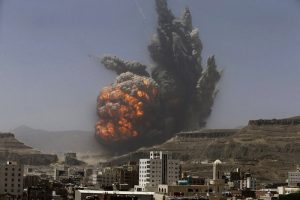 The death toll of the Yemeni war has reached 10,000 according to the UN, which pointed out that the figure “underscores the need to resolve the situation.”
The death toll of the Yemeni war has reached 10,000 according to the UN, which pointed out that the figure “underscores the need to resolve the situation.”
The Houthi uprising began in the northern part of the country at the end of 2014 before gaining momentum in January 2015. The crisis escalated with the intervention of the Saudi-led coalition, in March 2015, to reinstate President Hadi as the “legitimate” president of the country.
The UN stressed that “Yemen’s political elites have a responsibility to shield people from further harm, protect their country’s future and commit to a peaceful settlement.”
Special Envoy Ismail Ould Cheikh Ahmed said “the current political stalemate is causing death and destruction every day” and it can only be ended through a ceasefire and holding consultation to “develop a comprehensive agreement.”
Reaching an agreement to end the hostilities has proven difficult because the Houthi Movement and its allies are refusing to be disarmed and surrender their weapons without a comprehensive agreement that entails a joint transitional government contrary to the demands of the pro-Hadi government.
Latest clashes between the Houthi Movement and the pro-Hadi forces in the Shabwah governorate, southern Yemen, have left 34 people dead and 16 others injured.
